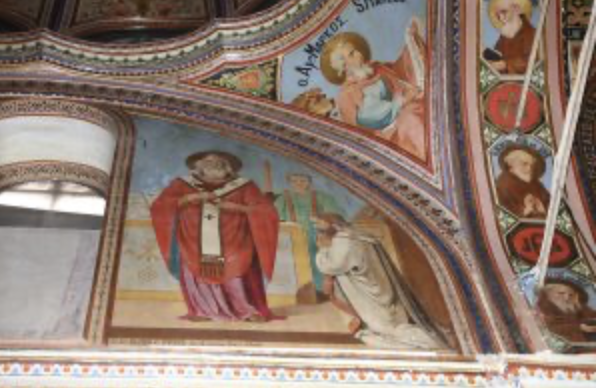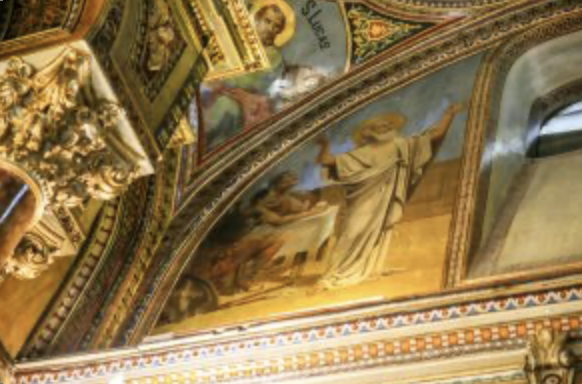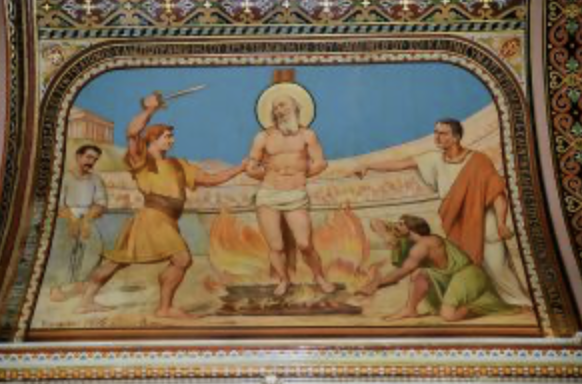St. Polycarp of Smyrna
69-156
Life of st. Polycarp
Imagine being able to sit at the feet of the apostles and hear their stories of life with Jesus from their own lips. Imagine walking with those who had walked with Jesus, seen him, and touched him. That was what Polycarp was able to do as a disciple of Saint John the Evangelist.
But being part of the second generation of Church leaders had challenges that the first generation could not teach about. What did you do when those eyewitnesses were gone? How do you carry on the correct teachings of Jesus? How do you answer new questions that never came up before?
With the apostles gone, heresies sprang up pretending to be true teaching, persecution was strong, and controversies arose over how to celebrate liturgy that Jesus never laid down rules for.
Polycarp, as a holy man and bishop of Smyrna, found there was only one answer — to be true to the life of Jesus and imitate that life. Saint Ignatius of Antioch told Polycarp “your mind is grounded in God as on an immovable rock.”
When faced with heresy, he showed the “candid face” that Ignatius admired and that imitated Jesus’ response to the Pharisees. Marcion, the leader of the Marcionites who followed a dualistic heresy, confronted Polycarp and demanded respect by saying, “Recognize us, Polycarp.” Polycarp responded, “I recognize you, yes, I recognize the son of Satan.”
On the other hand, when faced with Christian disagreements he was all forgiveness and respect. One of the controversies of the time came over the celebration of Easter. The East, where Polycarp was from, celebrated the Passover as the Passion of Christ followed by a Eucharist on the following day. The West celebrated Easter on the Sunday of the week following Passover. When Polycarp went to Rome to discuss the difference with Pope Anicetus, they could not agree on this issue. But they found no difference in their Christian beliefs. And Anicetus asked Polycarp to celebrate the Eucharist in his own papal chapel.
Polycarp faced persecution the way Christ did. His own church admired him for following the “gospel model” — not chasing after martyrdom as some did, but avoiding it until it was God’s will as Jesus did. They considered it “a sign of love to desire not to save oneself alone, but to save also all the Christian brothers and sisters.”
One day, during a bloody martyrdom when Christians were attacked by wild animals in the arena, the crowd became so mad that they demanded more blood by crying, “Down with the atheists; let Polycarp be found.” (They considered Christians “atheists” because they didn’t believe in their pantheon of gods.) Since Polycarp was not only known as a leader but as someone holy “even before his grey hair appeared”, this was a horrible demand.
Polycarp was calm but others persuaded him to leave the city and hide at a nearby farm. He spent his time in prayer for people he knew and for the Church. During his prayer he saw a vision of his pillow turned to fire and announced to his friends that the dream meant he would be burned alive.
As the search closed in, he moved to another farm, but the police discovered he was there by torturing two boys. He had a little warning since he was upstairs in the house but he decided to stay, saying, “God’s will be done.”
Then he went downstairs, talked to his captors and fed them a meal. All he asked of them was that they give him an hour to pray. He spent two hours praying for everyone he had every known and for the Church, “remembering all who had at any time come his way — small folk and great folk, distinguished and undistinguished, and the whole Catholic Church throughout the world.” Many of his captors started to wonder why they were arresting this holy, eighty-six-year-old bishop that didn’t stop them from taking him into the arena on the Sabbath. As he entered the arena, the crowd roared like the animals they cheered. Those around Polycarp heard a voice from heaven above the crowd, “Be brave, Polycarp, and act like a man.”
The proconsul begged the eighty-six-year-old bishop to give in because of his age. “Say ‘Away with the atheists'” the proconsul urged. Polycarp calmly turned to the face the crowd, looked straight at them, and said, “Away with the atheists.” The proconsul continued to plead with him. When he asked Polycarp to swear by Caesar to save himself, Polycarp answered, “If you imagine that I will swear by Caesar, you do not know who I am. Let me tell you plainly, I am a Christian.” Finally, when all else failed the proconsul reminded Polycarp that he would be thrown to the wild animals unless he changed his mind. Polycarp answered, “Change of mind from better to worse is not a change allowed to us.”
Because of Polycarp’s lack of fear, the proconsul told him he would be burned alive but Polycarp knew that the fire that burned for an hour was better than eternal fire.
When he was tied up to be burned, Polycarp prayed, “Lord God Almighty, Father of your beloved and blessed Son Jesus Christ, through whom we have received knowledge of you, God of angels and powers, of the whole creation and of the whole race of the righteous who live in your sight, I bless you, for having made me worthy of this day and hour, I bless you, because I may have a part, along with the martyrs, in the chalice of your Christ, to resurrection in eternal life, resurrection both of soul and body in the incorruptibility of the Holy Spirit. May I be received today, as a rich and acceptable sacrifice, among those who are in you presence, as you have prepared and foretold and fulfilled, God who is faithful and true. For this and for all benefits I praise you, I bless you, I glorify you, through the eternal and heavenly High Priest, Jesus Christ, your beloved Son, through whom be to you with him and the Holy Spirit glory, now and for all the ages to come. Amen.”
The fire was lit as Polycarp said Amen and then the eyewitnesses who reported said they saw a miracle. The fire burst up in an arch around Polycarp, the flames surrounding him like sails, and instead of being burned he seemed to glow like bread baking, or gold being melted in a furnace. When the captors saw he wasn’t being burned, they stabbed him. The blood that flowed put the fire out.
Polycarp Quotes
“Eighty and six years have I served Christ, nor has He ever done me any harm. How, then, could I blaspheme my King who saved Me? I bless Thee for deigning me worthy of this day and this hour that I may be among Thy martyrs and drink the cup of my Lord Jesus Christ.” ~ Polycarp
“Let us, therefore, forsake the vanity of the crowd and their false teachings, and turn back to the word delivered to us from the beginning.” ~ Polycarp
“Hear me declare with boldness, I am a Christian.” ~ Polycarp
“Beware of greed and remain pure and just. Restrain yourself from every vice. He who cannot restrain himself, how will he be able to teach others restraint?” ~ Polycarp
“by grace ye are saved, not of works,’ but by the will of God through Jesus Christ . . . If we please Him in this present world, we shall receive also the future world, according as He has promised to us that He will raise us again from the dead, and that if we live worthily of Him, ‘we shall also reign together with Him,’ provided only we believe . . .” ~ Polycarp
“Now may the God and Father of our Lord Jesus Christ, and the eternal high priest himself, the Son of God Jesus Christ, build you up in faith and truth and in all gentleness and in all freedom from anger and forbearance and steadfastness and patient endurance and purity.” ~ Polycarp
“For 86 years I have served Jesus Christ and he has never abandoned me. How could I curse my blessed king and savior?” ~ Polycarp
“If you imagine for a moment that I would do that, then I think you pretend that you don’t know who I am. Hear it plainly. I am a Christian.” ~ Polycarp
“I exhort you, press on in your course, and exhort all men that they may be saved.” ~ Polycarp
“If anyone does not refrain from the love of money, he will be defiled by idolatry and so be judged as if he were one of the heathen.” ~ Polycarp
“Be all of you subject one to another having your conduct blameless among the Gentiles, that you may both receive praise for your good works, and the Lord may not be blasphemed through you. But woe to him by whom the name of the Lord is blasphemed! Teach, therefore, sobriety to all, and manifest it also in your own conduct” ~ Polycarp
“Eighty and six years have I served Him, and He never did me any injury: how then can I blaspheme my King and my Savior?” ~ Polycarp
“But why do you delay? Come, do what you will.” ~ Polycarp
